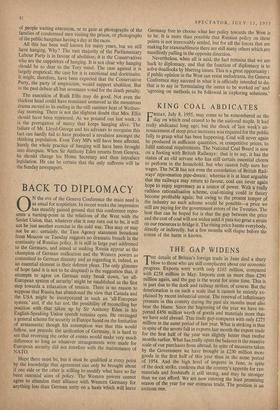BACK TO DIPLOMACY
0 N the eve of the Geneva Conference the main need is as usual for scepticism. In recent weeks the impression has steadily gained ground that this conference repre- sents a turning-point in the relations of the West with the Soviet Union, that, whatever else it may turn out to be, it will not be just another exercise in the cold war. This may or may not be so : certainly, the Tass Agency statement broadcast from Moscow on Tuesday suggests no dramatic breach in the continuity of Russian policy. It is still in large part addressed to the Germans, and aimed at making Russia appear as the champion of German unification and the Western powers as committed to German disunity and as regarding it, indeed, as an essential element in their defence plans. The only glimmer of hope (and it is not to be despised) is the suggestion that, if attempts to agree on German unity break down, 'an all- European system of security' might be established as the first step towards a relaxation of tension. There is no reason to suppose that Russia has abandoned the view that Canada and the USA might be incorporated in such an 'all-European system,' and, if she has not, the possibility of reconciling her position with that taken up by Sir Anthony Eden in his English-Speaking Union speech remains open. He envisaged a general scheme for security in Europe based on the limitation of armaments; though his assumption was that this would follow, not precede, the unification of Germany, it is hard to see that reversing the order Of events would make very much difference so long as whatever arrangements were made for European security did not interfere with the maintenance of NATO.
Hope there must be, but it must be qualified at every point by the knowledge that agreement can only be brought about if one side or the other is willing to modify what have so far been essential aims of policy. The Western powers cannot agree to abandon their alliance with Western Germany for anything less than German unity on a basis Which will leave Germany free to choose what her policy towards the West is to be. It is more than possible that Russian policy on these points is not irrevocably settled, but for all the forces that are making for reasonableness there are still many others which are manifestly pulling in the opposite direction.
Nevertheless, when all is said, the fact remains that we are back to diplomacy, and that the function of diplomacy is to solve deadlocks by blurring issues. This is a great opportunity : if public opinion in the West can resist melodrama, the Geneva Conference may succeed in what it is officially intended to do, that is to say in 'formulating the issues to be worked on' and `agreeing on methods to be followed in exploring solutions.'


































 Previous page
Previous page